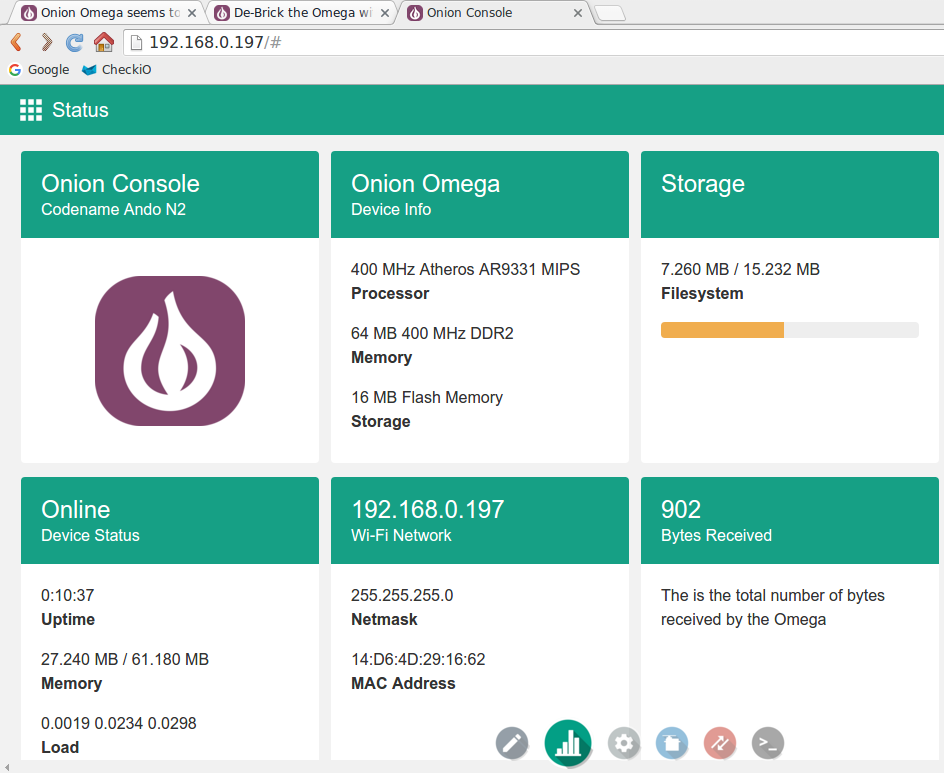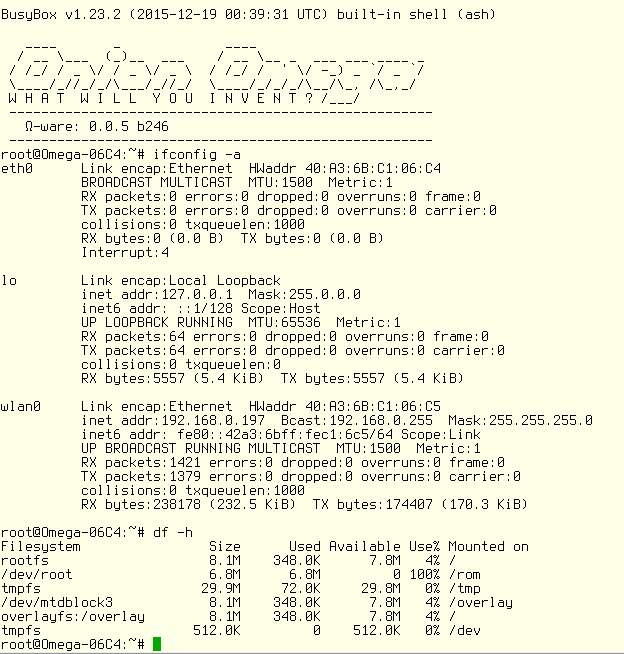Onion Omega seems to have no wifi
-
@Boken-Lin Any news on this? Haven't heard from you guys since my confirmation.
-
Hi @N-Willems, We sent out a package to you around two weeks ago. You should be receiving it in a week or so.
Cheers!
-
@Boken-Lin Thanks man!
-
@Boken-Lin
I received the ethernet expansion and matching dock today
-
@N-Willems Ok, now you will need to re-flash the Omega with the new firmwares. Please take a look at the wik article here: https://wiki.onion.io/Tutorials/Reflash-The-Firmware-With-Ethernet-Expansion. Can you following the steps until Step 6. Then take a screenshot of your browser window? The re-flash process will be slightly different because you will be flashing on a new
ubootfirst. Once you put up a screenshot here we will walk you over the flashing procedures.Cheers!
-
@Boken-Lin , I tried, but I can only get to step 4, no httpd.
However, I configured my laptop's networkinterface, and I can ping just fine over the ethernet. And I see a tftpboot command. If I'm not mistaken I only need the correct arguments for it.Here the output:
(sorry I don't know how to make a codeblock, <pre><code> does not seem to work)U-Boot 1.1.4 (Aug 28 2015 - 16:51:26) AP121 (ar9331) U-boot DRAM: 64 MB Top of RAM usable for U-Boot at: 84000000 Reserving 140k for U-Boot at: 83fdc000 Reserving 192k for malloc() at: 83fac000 Reserving 44 Bytes for Board Info at: 83fabfd4 Reserving 36 Bytes for Global Data at: 83fabfb0 Reserving 128k for boot params() at: 83f8bfb0 Stack Pointer at: 83f8bf98 Now running in RAM - U-Boot at: 83fdc000 Flash Manuf Id 0xef, DeviceId0 0x40, DeviceId1 0x18 flash size 16777216, sector count = 256 Flash: 16 MB Using default environment In: serial Out: serial Err: serial Net: ag7240_enet_initialize... No valid address in Flash. Using fixed address No valid address in Flash. Using fixed address : cfg1 0x5 cfg2 0x7114 eth0: 00:03:7f:09:0b:ad eth0 up : cfg1 0xf cfg2 0x7214 eth1: 00:03:7f:09:0b:ad athrs26_reg_init_lan ATHRS26: resetting s26 ATHRS26: s26 reset done eth1 up eth0, eth1 Hit any key to stop autoboot: 0 **ar7240>** httpd Unknown command 'httpd' - try 'help' ar7240> printenv bootargs=console=ttyS0,115200 root=31:02 rootfstype=squashfs init=/sbin/init mtdparts=ar7240-nor0:256k(u-boot),64k(u-boot-env),2752k(rootfs),13184k(uImage),64k(NVRAM),64k(ART) bootcmd=bootm 0x9f300000 bootdelay=4 baudrate=115200 ethaddr=0x00:0xaa:0xbb:0xcc:0xdd:0xee ipaddr=192.168.1.2 serverip=192.168.1.10 stdin=serial stdout=serial stderr=serial ethact=eth0 Environment size: 361/65532 bytes **ar7240>** ping 192.168.1.10 dup 1 speed 100 Using eth0 device host 192.168.1.10 is alive **ar7240>** tftpboot *** Warning: no boot file name; using '0201A8C0.img' Using eth0 device TFTP from server 192.168.1.10; our IP address is 192.168.1.2 Filename '0201A8C0.img'. Load address: 0x81000000 Loading: T T ^C Abort **ar7240>** ? reset - Perform RESET of the CPU ? - alias for 'help' boot - boot default, i.e., run 'bootcmd' bootd - boot default, i.e., run 'bootcmd' bootm - boot application image from memory cp - memory copy erase - erase FLASH memory help - print online help md - memory display mm - memory modify (auto-incrementing) mtest - simple RAM test mw - memory write (fill) nm - memory modify (constant address) ping - send ICMP ECHO_REQUEST to network host printenv- print environment variables progmac - Set ethernet MAC addresses run - run commands in an environment variable setenv - set environment variables tftpboot- boot image via network using TFTP protocol version - print monitor version
-
Hi @N-Willems, My mistake. You will first need to use
tftpto flash theubootto the production one first. You can do it by serving atftpserver on your computer, and running the following commands in the currentuboot:setenv ipaddr 192.168.1.1 setenv serverip 192.168.1.100 tftp 0x80000000 uboot.bin erase 0x9f000000 +0x10000 cp.b 0x80000000 0x9f000000 0x10000The
ubootbinary can be downloaded from: https://s3-us-west-2.amazonaws.com/onion-downloads/openwrt/uboot_for_omega_final.bin. Please make sure that you first disconnect from your Wifi network on your computer, so that the IP address for your computer is assigned properly.After, you are done with that, you will need to flash the ART partition (which contains Omega WiFi calibration data). You do this by going into the FIrmware re-flash interface, as outlined by the wiki article https://wiki.onion.io/Tutorials/Reflash-The-Firmware-With-Ethernet-Expansion. But, instead of flashing the firmware image, you will click on the link at the bottom of the screen which says ART Update. ART partition binary can be downloaded here: https://s3-us-west-2.amazonaws.com/onion-downloads/openwrt/art_for_omega.bin.
Then, you will need to tell the Omega what it's MAC address is. Reboot again, and enter the
ubootprompt, and issue the following command:setmac 40:A3:6B:C1:06:C5Finally, you will be flashing the firmware for the Omega, which can be downloaded here: http://repo.onion.io/omega/images/.
-
@Boken-Lin We made it!



-
@N-Willems Yay!! That's awesome

-
Thanks for your assistance, great support!
